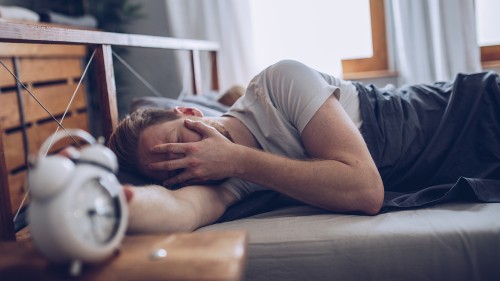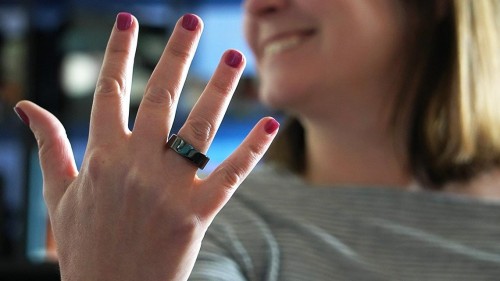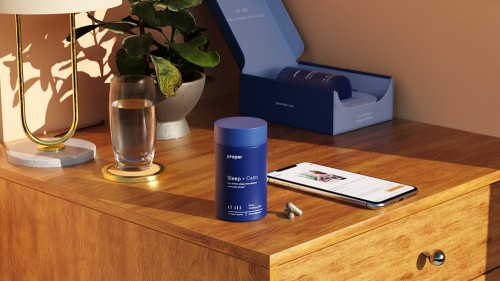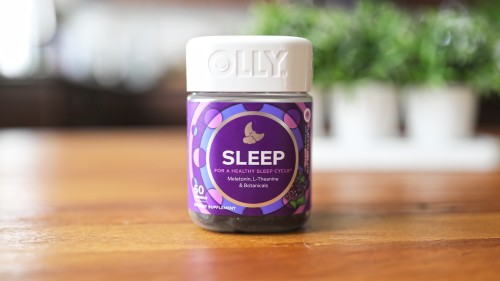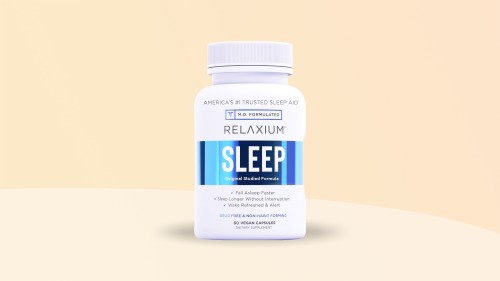10 Evidence-Based Tips for Sleeping Better at Night
Published on October 1, 2021
Medically Reviewed by Anthony Dugarte, MD
Sleep is one of the most neglected health habits, yet it might be one of the most important. Here are evidence-based tips for getting a better night of sleep.

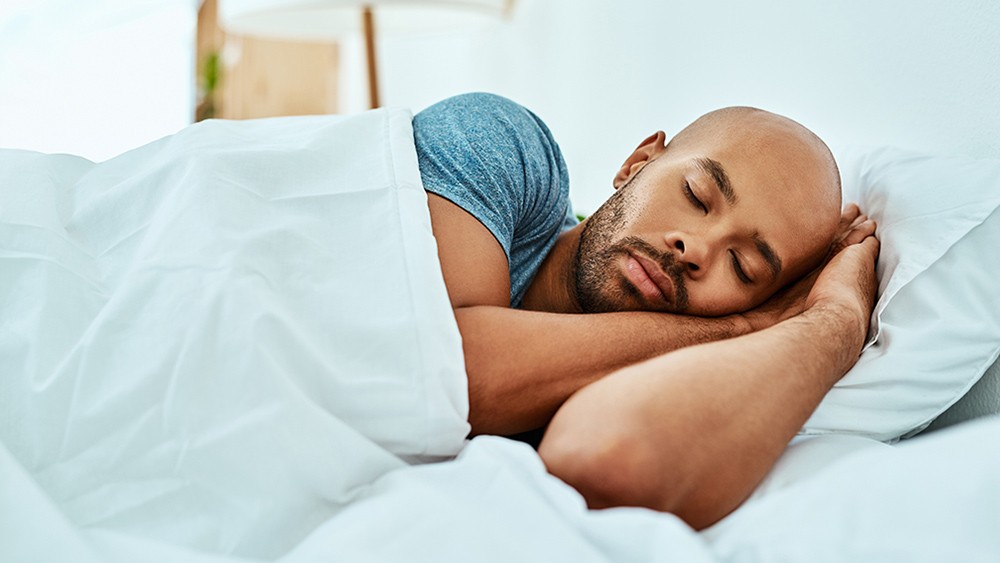
According to the Center for Disease Control statistics, adults need at least 7 hours of sleep each night to feel their best. (1)
Unfortunately, about 35% of Americans don’t get the recommended amount, leaving them chronically drowsy and keeping them from performing their best.
The problem is much more than just a matter of feeling tired. Sleep deprivation can increase the risk of the following physical and mental health problems: (2)
- Moodiness and symptoms of depression (3)
- Heart conditions, including hypertension (4)
- Gastrointestinal problems, including stomach pain, nausea, gas, constipation, and diarrhea (5)
- Poor blood sugar regulation (6)
- Increased headaches
- Premature skin aging (7)
- Brain fog and hallucinations
- Increased sleep apnea
- Restless leg syndrome
These health problems occur because sleep affects every part of the body. (8)
While genetics play a role in how much sleep we need, proper sleep routines regulate growth and stress hormones, the immune system, brain function, memory, breathing, and even normal appetite and weight maintenance. (9)
Getting enough sleep is essential. But how can you help yourself improve your nightly rest regimen?
Here are ten evidence-based ways on how to sleep well and improve the quality and duration of your nocturnal slumber.
1. Eat Foods That Promote Sleep
Good nutrition is important for every function of the human body, including sleep.
Some whole foods even have melatonin, magnesium, and tryptophan, which promote a good night’s rest.
Sometimes called the sleep hormone, melatonin is usually released from your brain once sunlight begins to dim.
Research shows that some people don’t make enough melatonin on their own and that supplementation under a doctor’s care may be warranted. (10)
However, there are also foods that contain melatonin, including mushrooms, tart cherries, and tart cherry juice, nuts (like almonds, pistachios, and walnuts), milk, and eggs. (11)
Having some of these during your evening meal may help improve sleep.
Research shows that people low in magnesium have trouble sleeping, likely because magnesium helps regulate neurotransmitters that contribute to a good night’s rest. (12)
Regularly eating foods high in magnesium, including pumpkin seeds, chia seeds, black beans, spinach, and nuts like peanuts, almonds, and cashews can help ensure you’re getting enough.
Tryptophan, an amino acid found in milk, turkey, chicken, tuna, and oats, is another component in food that may promote healthy sleep. (13)
It seems to work by increasing serotonin and melatonin production and may even be helpful when eaten during the morning meal. (14)
Try incorporating oatmeal made with milk into your breakfast daily.
Other sleep-promoting foods include chamomile tea, fatty fish like salmon, and kiwifruit. (15, 16, 17)
Timing your meal may also be necessary for some people.
If you suffer from reflux, eating within three hours of bedtime may cause reflux to flare, especially if you eat trigger foods like acidic or spicy foods.
Reflux sufferers may also benefit from sleeping on their left side. (18)
Summary
Certain foods can improve sleep, so try adding some of these to your diet. In addition, avoid eating too close to bedtime.
2. Eat Foods That Promote a Healthy Microbiome
Research shows that a healthy gut microbiome can contribute to better sleep efficiency and increased sleep time. (19)
Scientists aren’t sure why this occurs, but it may be related to the gut-brain connection, a newer area of research showing that our entire body depends on gut health. (20)
Regularly eating probiotic foods, or foods that contain live, beneficial microbes, is one way to add to the existing population in your digestive system.
Almost every culture in the world has adopted its probiotic foods over the centuries.
These foods include kimchi, kefir, kombucha, yogurt, unpasteurized sauerkraut, tempeh, miso, and refrigerated pickles.
The probiotics in your gut can’t thrive without being fed.
Prebiotic foods like whole grains, fruits, vegetables, and pulses are full of the fiber needed to keep your microbiome healthy.
Specific foods that have been proven to feed the good microbes include onions, garlic, asparagus, jicama, Jerusalem artichokes, bananas, apples, whole wheat, barley, and chickpeas.
Some people find that adding a probiotic supplement improves their gut-health routine. However, there are a lot of supplements to choose from, and selecting the right one can be confusing.
In general, it’s best to find a product that:
- has at least 10–20 billion colony forming units (CFU’s)
- contains several strains that have been specifically proven to improve gut health
- has been tested by a third party for quality, purity, and potency
Always ask your doctor if it’s safe for you before trying any new medications or supplements.
A doctor or a dietitian can also help you determine which strains of probiotic bacteria may be helpful for your goals.
Summary
Adding fermented foods, a probiotic supplement, or foods high in prebiotics may be beneficial for improving sleep.
3. Respect Your Circadian Rhythm
We are humans. Humans have been part of the earth for a long, long time.
Only in the most recent part of human history has ingenuity created the ability to break away from our natural 24-hour day and night cycle.
The 2017 Nobel Prize for Medicine was awarded to scientists who pinpointed molecular components in our cells that control the circadian rhythm. (21)
Their research provided scientific reasons why most humans are programmed to rest during the dark hours and wake with the sun.
Fighting or constantly changing that cycle can throw off the internal clock, leading to erratic sleep patterns.
While today’s work lifestyles with shiftwork and travel don’t always lend to keeping a day-night routine, try to stay as consistent as possible.
Making a consistent schedule of going to bed for seven to nine hours, and waking at the same time every day, can improve sleep quality. (22)
Summary
A consistent daily sleep schedule (even on weekends) can help regulate your natural internal clock.
4. Take a Blue Light Break for Restful Sleep
Taking control of your light exposure can also help regulate a healthy circadian clock. (23)
The sun is our natural source of blue light. It activates hormones and cell functions that cause wakefulness and suppress melatonin production.
Some research shows that daytime exposure to the sun’s blue light improves sleep at night. (24)
Blue light is also emitted from LED lights in our electronic devices, fluorescent lightbulbs, and LED televisions.
Using them at night can artificially trick the brain into thinking it’s daytime, leading to disrupted sleep. Turning off electronic devices a couple of hours before bedtime may promote better rest.
Instead of checking your work email or social media, try reading a paper book by the light of a non-fluorescent lamp before bedtime to wind down.
If it’s not possible to completely turn off your electronic devices, switching their settings from blue to yellow light may help.
Summary
Reducing exposure to blue light before bed can help promote restful sleep.
5. Get Daily Exercise and Time It Right
A 2017 systematic review of studies found that daily exercise improves sleep. (25)
The review covered 34 studies of people following recommendations by the American College of Sports Medicine. The evidence seems to be especially strong for older adults.
Furthermore, the exercise doesn’t have to be excessive. People may see an improvement in their sleep with as little as 30 minutes of moderate exercise each day. (26)
Timing when you exercise may not matter as much as experts previously thought.
A review of 23 studies published in Sports Medicine in October 2018 found information that contradicted the previous belief that evening exercise negatively affects sleep. (27)
The reviewers found that the sleep quality of evening exercisers was better than those who didn’t exercise at all.
However, the review did find exceptions. It discovered that vigorous exercise within one hour of bedtime did have a negative effect on both onset and duration of sleep.
Aerobic exercise releases endorphins and increases body temperature, factors that can cause wakefulness, and it takes about 30–90 minutes to wind down after the workout.
Summary
Exercise at least 30 minutes daily at least 2 hours before bedtime.
6. Avoid Long, Late Naps
Napping has been shown to benefit daytime alertness and brain function, especially when they are taken in the early to mid-afternoon. (28, 29)
However, long naps may disrupt nocturnal sleep, especially if taken late in the day.
One study found that people who took naps for longer than one hour had more trouble falling asleep at night. (30)
Another study found that daytime napping, in general, led to more fragmented sleep patterns. (31)
If you enjoy napping and find them beneficial, The National Institutes of Health recommend avoiding naps after 3 pm and keeping them to under an hour for better sleep at night. (32)
Summary
Avoid naps longer than an hour. In addition, avoid naps after 3 pm.
7. Invest in Comfort
Because we spend about one-third of our lives trying to sleep, it makes sense to spend what you can afford to make your bedroom comfortable.
The investment is not just a luxury; it can improve sleep onset and duration.
For starters, a good quality mattress is critical.
One study found that elderly, long-term care patients who slept in higher quality mattresses fell asleep faster than patients on lower quality mattresses. (33)
The patients who used these mattresses also had less daytime musculoskeletal pain.
A 2015 systematic review of studies found that the optimal mattress for sleep quality and duration, and spinal alignment, is one that is medium-firm and custom inflated or adjusted. (34)
Cooler temperature regulation is also a significant factor in sleep quality.
Although every individual regulates body temperature slightly differently, experts have found that the optimal thermostat setting is between 66–70 degrees Fahrenheit (19–21 Celsius). (35)
This corresponds with normal circadian nocturnal drops in body temperature.
Temperature is so critical that one study found sleep duration and quality were more dependent on optimal temperature than quiet noise conditions. (36)
Summary
Make your sleep environment and bedding as comfortable as possible.
8. Manage Stress
Stress is a normal part of life that humans deal with daily. Work, financial worries, school, caring for family, and other day-to-day triggers can cause acute or short-term stress. (37)
During episodes of stress, the brain releases a hormone called cortisol, which is designed to make the brain alert in part by boosting blood pressure, heart rate, and blood sugar release. (38)
As part of the circadian rhythm, cortisol is usually produced in small amounts during daylight hours, keeping us mentally sharp and better able to deal with life’s challenges.
But when stress carries over into the evening hours, the hormone release can lead to insomnia. About 10–30% of people suffer from insomnia, which ironically can lead to more stress. (39)
Specific relaxation exercises may reduce cortisol release. The activities are designed to slow breathing and lower heart rate and blood pressure. These exercises include: (40)
- Deep breathing techniques in which the individual takes slow, deep breaths for a few minutes at bedtime. One example is 4-7-8 breathing, which is taking a deep breath in through the nose for four seconds, holding the breath for seven seconds, then releasing the air through the mouth for eight seconds.
- Mindful meditation and visualization, including the body scan technique. The exercise combines deep breathing with a quiet, gradual visualization of each body part from feet to head. (41)
When stress is chronic, some individuals need help from a trained mental health therapist.
In 2017, a review of studies concluded that cognitive behavioral therapy (CBT) is an effective way to treat insomnia. (42)
Therapist-led CBT helps individuals learn emotional coping strategies for their problems and helps them develop ways to change ways of thinking and behaviors.
Summary
Using various methods such as breathing, therapy, or meditation to manage stress can help improve sleep patterns.
Related: Evidence-Based Ways to Relieve Stress and Anxiety
9. Watch Your Alcohol, Caffeine, and Nicotine
While some people find that having an alcoholic beverage helps them sleep, research shows that this may not be the case for everyone, especially if it’s a nightly habit. (43)
Alcohol may have a negative effect on sleep quality. It may affect melatonin and human growth hormone production, which can alter the circadian rhythm.
Excess alcohol can also increase snoring and sleep apnea, which affects the quality of rest. (44)
Caffeine is a well know nervous system stimulant, and some people are more sensitive than others.
Most experts recommend cutting off caffeine, including green tea, black tea, and coffee, at least 6 hours before sleep. (45)
Decaffeinated and chocolate both have small amounts of caffeine, so you may need to avoid these as well.
Nicotine is another stimulant that can decrease sleep quality.
A study involving over 3,500 adults showed that smokers have trouble initiating sleep and staying asleep. (46)
Researchers concluded that in addition to the drug’s stimulant effects, users go through nightly withdrawal symptoms that interrupt a good night’s rest.
The Center for Disease Control offers free help for people who want to quit smoking.
Summary
Avoid or limit stimulants like alcohol, caffeine, or nicotine for a better night’s sleep.
10. Keep a Sleep Diary
When all else fails, keeping a sleep diary may help poor-sleep sufferers see the big picture. (47)
A diary can keep track of how well you’re sticking to a scheduled sleep routine, follow your exercise patterns, and find what you ate or drank that promoted or curtailed your rest.
A detailed sleep diary is also a handy tool to use when you feel it’s time to seek help from a doctor.
The doctor can use the journaled information to help determine if the problem is a sleep disorder that may require medical treatment.
The Sleep Foundation offers more information about keeping a sleep diary, as well as a printable diary. (48)
Summary
Keeping a sleep diary can provide insight into what might be impacting your sleep.
The Bottom Line
Getting the recommended seven hours of sleep is so crucial for human health that endless studies have been conducted on the topic.
There are many ways to promote a healthy night’s rest, including what we put in our bodies, exercise, stress management, and respecting the circadian rhythm.
When well-researched information about sleep tips is not enough, it may be time to seek help from your doctor.
Always consult a doctor before taking supplements or medications to aid sleep, to make sure they’re safe for you.
At WellnessVerge, we only use reputable sources, including peer-reviewed medical journals and well-respected academic institutions.
- Center for Disease Control: Sleep and Sleep Disorders:
https://www.cdc.gov/sleep/data_statistics.html - The National Institue for Occupational Safety and Health: Sleep deprivation:
https://www.cdc.gov/niosh/emres/longhourstraining/sleepdeprivation.html - Sleep and depression:
https://pubmed.ncbi.nlm.nih.gov/16259539/ - Sleep duration predicts cardiovascular outcomes: a systematic review and meta-analysis of prospective studies:
https://academic.oup.com/eurheartj/article/32/12/1484/502022 - Sleep Dysfunction and Gastrointestinal Diseases:
https://www.ncbi.nlm.nih.gov/pmc/articles/PMC4849511/ - Poor Sleep Linked With Higher Blood Sugar:
https://newsinhealth.nih.gov/2020/07/poor-sleep-linked-higher-blood-sugar - Does poor sleep quality affect skin ageing?:
https://pubmed.ncbi.nlm.nih.gov/25266053/ - The Benefits of Slumber:
https://newsinhealth.nih.gov/2013/04/benefits-slumber - Insufficient sleep undermines dietary efforts to reduce adiposity:
https://www.ncbi.nlm.nih.gov/pmc/articles/PMC2951287/ - New perspectives on the role of melatonin in human sleep, circadian rhythms and their regulation:
https://www.ncbi.nlm.nih.gov/pmc/articles/PMC6057895/ - Dietary Sources and Bioactivities of Melatonin:
https://www.ncbi.nlm.nih.gov/pmc/articles/PMC5409706/ - Does Magnesium Help You Sleep?:
https://health.clevelandclinic.org/does-magnesium-help-you-sleep/ - Conversion L-tryptophan to melatonin in the gastrointestinal tract: the new high performance liquid chromatography method enabling simultaneous determination of six metabolites of L-tryptophan by native fluorescence and UV-VIS detection:
https://pubmed.ncbi.nlm.nih.gov/23388477/ - Effects of tryptophan-rich breakfast and light exposure during the daytime on melatonin secretion at night:
https://pubmed.ncbi.nlm.nih.gov/25407790/ - Chamomile: A herbal medicine of the past with bright future:
https://www.ncbi.nlm.nih.gov/pmc/articles/PMC2995283/#:~:text=Chamomile%20is%20widely%20regarded%20as,and%20CNS%20depressant%20effects%20respectively. - Effect of kiwifruit consumption on sleep quality in adults with sleep problems:
https://pubmed.ncbi.nlm.nih.gov/21669584/ - The mediating role of sleep in the fish consumption – cognitive functioning relationship: a cohort study:
https://www.nature.com/articles/s41598-017-17520-w - A Novel Sleep Positioning Device Reduces Gastroesophageal Reflux: A Randomized Controlled Trial:
https://pubmed.ncbi.nlm.nih.gov/26053170/ - Gut microbiome diversity is associated with sleep physiology in humans:
https://www.ncbi.nlm.nih.gov/pmc/articles/PMC6779243/ - The Brain-Gut Connection:
https://www.hopkinsmedicine.org/health/wellness-and-prevention/the-brain-gut-connection - Scientific Background Discoveries of Molecular Mechanisms Controlling the Circadian Rhythm:
https://www.nobelprize.org/prizes/medicine/2017/advanced-information/ - Natural Patterns of Sleep:
https://healthysleep.med.harvard.edu/healthy/science/what/sleep-patterns-rem-nrem - Three Types of Cells Help the Brain Tell Day From Night:
https://www.salk.edu/news-release/three-types-of-cells-help-the-brain-tell-day-from-night/ - Blue-enriched white light in the workplace improves self-reported alertness, performance and sleep quality:
https://pubmed.ncbi.nlm.nih.gov/18815716/ - Interrelationship between Sleep and Exercise: A Systematic Review:
https://www.ncbi.nlm.nih.gov/pmc/articles/PMC5385214/ - Exercising for Better Sleep:
https://www.hopkinsmedicine.org/health/wellness-and-prevention/exercising-for-better-sleep - Effects of Evening Exercise on Sleep in Healthy Participants: A Systematic Review and Meta-Analysis:
https://pubmed.ncbi.nlm.nih.gov/30374942/ - Exploring the nap paradox: are mid-day sleep bouts a friend or foe?:
https://www.ncbi.nlm.nih.gov/pmc/articles/PMC5598771/ - Afternoon Nap and Bright Light Exposure Improve Cognitive Flexibility Post Lunch:
https://www.ncbi.nlm.nih.gov/pmc/articles/PMC4446306/ - Correlates and influences of taking an afternoon nap on nocturnal sleep in Chinese elderly: A qualitative study:
https://pubmed.ncbi.nlm.nih.gov/29653772/ - Association between Nighttime Sleep and Napping in Older Adults:
https://www.ncbi.nlm.nih.gov/pmc/articles/PMC2398743/ - A Good Night's Sleep:
https://www.nia.nih.gov/health/good-nights-sleep - Effects of an adapted mattress in musculoskeletal pain and sleep quality in institutionalized elders:
https://www.ncbi.nlm.nih.gov/pmc/articles/PMC4688575/ - Effect of different mattress designs on promoting sleep quality, pain reduction, and spinal alignment in adults with or without back pain; systematic review of controlled trials:
https://pubmed.ncbi.nlm.nih.gov/29073401/ - The Temperature Dependence of Sleep:
https://www.ncbi.nlm.nih.gov/pmc/articles/PMC6491889/ - Relative and combined effects of heat and noise exposure on sleep in humans:
https://pubmed.ncbi.nlm.nih.gov/1811316/ - Stress effects on the body:
https://www.apa.org/topics/stress/body - Physiology, Cortisol:
https://www.ncbi.nlm.nih.gov/books/NBK538239/ - Prevalence of chronic insomnia in adult patients and its correlation with medical comorbidities:
https://www.ncbi.nlm.nih.gov/pmc/articles/PMC5353813/ - Relaxation Exercises To Help Fall Asleep:
https://www.sleepfoundation.org/sleep-hygiene/relaxation-exercises-to-help-fall-asleep - Mindfulness meditation and exercise both improve sleep quality: Secondary analysis of a randomized controlled trial of community dwelling adults:
https://pubmed.ncbi.nlm.nih.gov/32448712/ - Let's talk about sleep: a systematic review of psychological interventions to improve sleep in college students:
https://onlinelibrary.wiley.com/doi/full/10.1111/jsr.12568 - Sleep, Sleepiness, and Alcohol Use:
https://pubs.niaaa.nih.gov/publications/arh25-2/101-109.htm - Alcohol, snoring and sleep apnoea:
https://www.ncbi.nlm.nih.gov/pmc/articles/PMC491372/pdf/jnnpsyc00048-0079.pdf - Caffeine Effects on Sleep Taken 0, 3, or 6 Hours before Going to Bed:
https://jcsm.aasm.org/doi/10.5664/jcsm.3170 - The relation between cigarette smoking and sleep disturbance:
https://pubmed.ncbi.nlm.nih.gov/8078854/ - How a sleep diary can transform how you feel:
https://www.mayoclinic.org/healthy-lifestyle/adult-health/in-depth/how-a-sleep-diary-can-transform-how-you-feel/art-20342128 - The Sleep Foundation: Sleep Diary:
https://www.sleepfoundation.org/sleep-diary

